Buying a piano is a significant investment, both financially and emotionally.
That’s why at our family-focused piano store, we value transparency and education in our sales process. We want our customers to feel informed and empowered when making such a big purchase!
Unfortunately, not all piano salespeople share this value. Some may use sneaky tactics to try and make a quick sale; or spew misinformation and myths to confuse customers.
That’s why we’ve put together this guide to expose 8 piano salesman tricks and myths that you should watch out for. Whether you’re a beginner or an experienced pianist, these tricks can affect anyone looking to buy a piano!
Meaningless Piano Terms, Buzzwords & Jargon
When shopping for a piano, you may come across some buzzwords and jargon that sound impressive but ultimately don’t mean much.
One common example of this is the overuse of the term “German engineering” or “hand-built construction” in acoustic pianos.
People of several nationalities contributed to the modern piano over time. And all pianos require manual labor to some degree. This means all pianos have some “German engineering” and “Italian engineering” and “American engineering” and etc — and all are some level of “handmade.”
Unless you’re talking about an instrument fully designed and manufactured within these countries or by hand somehow, these terms ultimately are more of a marketing schtick.
Another example for digital pianos is the use of the term “grand action” — or really anything that tries to equate a digital piano to a grand piano. Terms like these are often used to make a digital piano seem more like a traditional acoustic piano. In reality, the action of a digital piano is fundamentally different from that of an acoustic piano.
While some digital pianos may have a more realistic feel than other digital pianos — and some may even have hammer actions which are closer to that of a grand piano — the term “grand anything” is often just a marketing ploy.
There are many more examples such as “premium materials” but not necessarily construction, “authentic touch” which is hard to qualify, and “wooden parts” but not necessarily entire components.
So be wary salespeople who try a little too hard to make a product sound better than it actually is. Instead, focus on the actual performance of the piano, and try it out for yourself to see how it feels and sounds!
This is “Just Like” That
Ever been told that one piano brand or model is “just like” another, more expensive one? Or that a digital piano can replace an acoustic piano because it’s “just like” the real thing?
Beware of these false comparisons. They’re salesman tricks meant to convince you to buy a product that may not actually meet your needs or expectations.
We had a customer who was told that a Pearl River piano was “just like a Bosendorfer, but at a better price.” While there are some excellent Pearl River pianos, this is simply not true whatsoever! But instead of thinking about the piano in front of them, the customer was easily convinced they were getting a much higher-quality piano than they actually were.
Do note that even pianos that are made by the same manufacturer can be different too. For example, Steinway-designed Boston pianos are different from Kawai pianos, even though they’re both built by Kawai — and Boston pianos aren’t “just like” Steinways either!
Are Boston pianos just like Steinway pianos? No! Different factory, different parts, different purpose. Read more details in our Kawai vs Steinway article!
Ultimately, each piano has its own unique sound, touch, and personality. So if you hear a salesperson trying to sell you on “just like” comparisons, especially when trying to pass off a cheaper instrument, keep asking them to elaborate until their nonsense is exposed!
Selling a Piano Without Playing It
Many salespeople are great storytellers, but that doesn’t mean the piano they’re selling is the right one for you. So one of the biggest mistakes you can make when buying a piano is letting a salesperson sell you on a backstory or prestige without actually hearing the piano for yourself.
You should be encouraged to play as many pianos as you like and to play them for yourself. It’s important to make an informed decision within the context of your own needs and preferences, not just what a salesperson tells you is “the best.”
The best way to curb this issue is to not be afraid to play yourself. Working with many beginners, we understand there may be nervousness as a result of not playing. But even punching C chords throughout the piano’s entire range gives you some idea of the feel and sound. A piano does sound different as the pianist vs as the audience!
So don’t be afraid to take control of the situation, ask questions, and feel and hear the piano (from multiple angles). A good salesperson will be happy to accommodate your requests and help you find the right piano for your needs and budget. With a big purchase like this, you want to make sure you’re getting the piano that’s right for you, not just the one that’s being sold to you.
New Pianos are Always Better than Used Pianos
While there are certainly advantages to buying a brand-new piano, such as having a warranty and being the first owner, there are also many benefits to buying a used piano.
For one thing, used pianos can often be found at a lower price than new pianos, making them a great option for those on a budget. Additionally, older pianos can have a unique character and tone that can be hard to replicate in a new piano.
We’ve heard from some customers that they were told a piano past 35 years old is completely worn out and should be replaced with a new one. This is simply not true, and there are even recital halls with pianos older than that. The actual lifespan of a piano varies depending on things like how well it’s been maintained and the quality of its original construction.
As we cover in our How Piano Age article, a piano can get up to 100+ years old with proper care!
Now, if you’re considering buying a used piano, it is important to make sure you’re getting a quality instrument. One way to do this is by verifying the complete serial number of the piano, which will tell you the year and country of manufacture. Be wary of any salesperson who tries to hide or obscure the serial number too. This goes beyond being a salesman trick to being an outright red flag. They may be trying to sell you a lower-quality or even counterfeit instrument!
Older Pianos from “The Golden Age of the Piano”
The term “Golden Age of Pianos” is often used to describe a specific era in piano manufacturing, typically from the late 19th century to the mid-20th century. And there is some validity to the idea that pianos made during this time have a unique character and quality, largely due to the materials and manufacturing techniques used.
However, it’s important to note that this doesn’t apply to all older pianos. Unless it’s a big-name brand, older pianos straight off the street are often basically worthless now.
It’s similar to vintage cars – it could be a rust bucket, or it could be a well-maintained classic that still turns heads. If a “Golden Era” Steinway piano has been meticulously maintained, restored, or rebuilt with high-quality parts, it can still be a great and unique instrument!
It is worth pointing out that modern pianos made with CNC machines and precise engineering are generally superior to older ones. Even companies like Mason & Hamlin and Steinway are constantly improving their designs and manufacturing processes. Overall, average quality has improved greatly over the years!
The reality is that anything from the early 20th century will require a substantial investment of around $25,000 to fully rebuild and restore with new parts. While we ourselves sell older pianos that were maintained well enough to be refurbished to our standards, we still price them very affordably. The only pianos that get fully rebuilt are ones of historical significance, and those are exceedingly rare cases.
There’s nothing wrong with an older piano if it’s the piano you love. But the idea of a “Golden Era” is often smoke and mirrors used by some salespeople to inflate the value of older pianos. As always, focus on buying a piano based on how it plays, not based on age or stories.
Chinese Pianos Are Cheap
You hear this for all types of products, and the myth is even present in the piano industry too. Surely, you don’t think your iPhone is a cheap phone though!
The truth is that the quality of manufacturing in China varies greatly, and it’s this flexibility that makes them so attractive to foreign companies.
The perception that Chinese pianos are cheap and low-quality additionally stems from the fact that Chinese manufacturers entered the market relatively recently and started by producing entry-level pianos at a lower price point.
In recent years though, Chinese piano makers have made great strides in improving the quality of their pianos. Some Chinese brands, such as Pearl River and Hailun, have won awards for their pianos’ quality and design. These pianos are made with modern manufacturing techniques and high-quality materials, resulting in pianos that can rival those made in other countries, including Europe and the United States.
Of course, not every Chinese-made piano is of the same quality. So as with any piano, it’s important to do your research and try out different models to find one you like. Just don’t dismiss a piano simply because it was made in China — you might be missing out on a great instrument at a reasonable price.
Steinway Pianos Appreciate in Value
For decades, Steinway has gotten away with tons of myths perpetuated over time. But the idea that one that isn’t authentic anymore because each of its 10,000+ parts isn’t made by Steinway themselves (Franken-Steinways or Stein-Was pianos, as enthusiasts may call them) isn’t as harmful as this one.
No, Steinway pianos do not hold their value.
No, Steinway pianos do not appreciate in value.
No, Steinway pianos are not a good investment financially.
With the exception of the million dollar ones made as art pieces, all Steinway pianos depreciate in value over time. While they make the claim that Steinway pianos gain value in their brochures and videos — and even point to it as a justification of their high prices — this is categorically false.
Steinway argues that since used Steinways are valued at a fraction of brand new ones, and new Steinway prices go up every year, that used Steinway prices should also go up every year. While this may be slightly true for the first few years, used Steinway prices will not hold value over decades.
This is a popular video that’s actually sponsored by Steinway. So they don’t cover that a big reason they’re so expensive is their marketing prowess. They have successfully built a brand associated with high-quality, handcrafted (recall our first tip) pianos.
Unfortunately, there have been many instances of customers upset that their Steinway piano wasn’t a proper investment.
It is important to remember that the private-market value of a piano is based on supply and demand. And just like a car, a piano loses value as soon as it is purchased and “driven off the lot.”
We ourselves enjoy having Steinways our showroom floor. But we think people should buy a Steinway because they love it, not because it’s a financial investment that can be sold for more money later.
Kawai Pianos = Plastic Parts = Bad
As a Kawai dealer, this myth obviously affects public opinion on instruments we sell and enjoy playing ourselves. So we’ll point out this bias and even be charitable in addressing this claim.
But no, Kawai doesn’t use any old plastic parts.
Many piano manufacturers do use some plastic. But there are many different types of plastic, and while we don’t like its affect on the climate generally, it is somewhat appropriate for use by the niche piano industry which makes durable and long-lasting instruments.
Kawai uses a high-tech carbon fiber composite material called ABS Styran to make some of the key components in the action and hammer assemblies. This material is incredibly strong and resilient, and can withstand years of heavy use without wearing down as much as a traditional action. It’s been proven to improve the performance and longevity of Kawai pianos many times too.
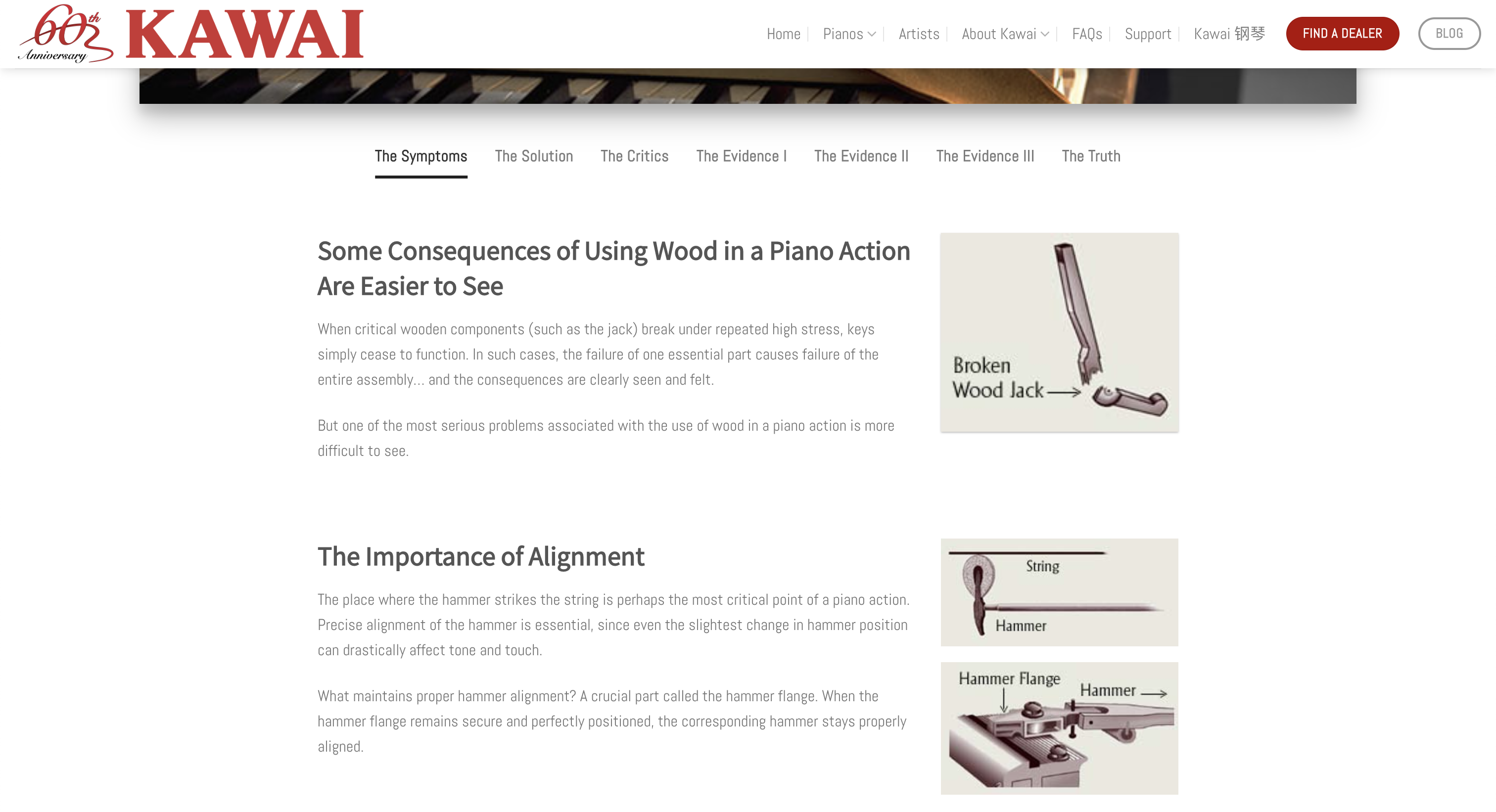
Now, to be charitable, we ourselves would appreciate seeing the data published ourselves too. But the studies on their site do seem very believable and reasonable given the natures of carbon fiber vs wood.
It’s worth mentioning that Kawai also uses other traditional materials in their pianos, such as premium woods and metals. Overall, they use the best materials for the job. For some jobs, wood is the best material, because of its tonal characteristics (soundboard), flexibility (hammer shanks), or ability to grip (pinblock). For other jobs, especially ones that involve lots of movement and friction, ABS is the superior choice.
Ultimately, the idea that Kawai pianos are somehow inferior because they use “plastic” parts is a baseless myth used as a salesman trick.
Kawai pianos are widely regarded as some of the highest-quality pianos in the world, and are used by professional musicians and concert venues around the globe. Definitely try one to feel the difference for yourself — we’re sure even skeptics will be convinced.
General Advice to Avoid Piano Salesman Tricks
The piano industry is generally great, and this isn’t intended to be a hit piece on other pianos or piano dealers. But predatory people do exist, and they do use some of these salesman tricks!
Just like with other high-value sales, they may try to use general sales tactics like:
- Selling you on monthly cost instead of total cost
- Pricing high (or hiding prices altogether) to promote haggling and price discrimination
- Offering massive discounts as soon as you walk in the door
- Creating a false sense of urgency that makes you anxious to buy soon
- Making false promises about the product overall
So do make sure you’re aware of all these potential red flags if you’re shopping for a piano! Don’t be afraid to take notes on what’s being said so you can verify information later. And if a salesperson gives you a bad feeling, don’t go through with it!
We have worked with stores across the country who get all this right. And we’re not trying to say you need to be hyper-vigilant when you shop for pianos.
But we hope exposing these salesman tricks make sure you definitely don’t fall for any predatory sales! We hate them as much as anyone else, and we want everyone to find a piano they love genuinely.
Any piano salesman tricks or myths you’ve experienced that we didn’t cover here? Let us know in the comments!

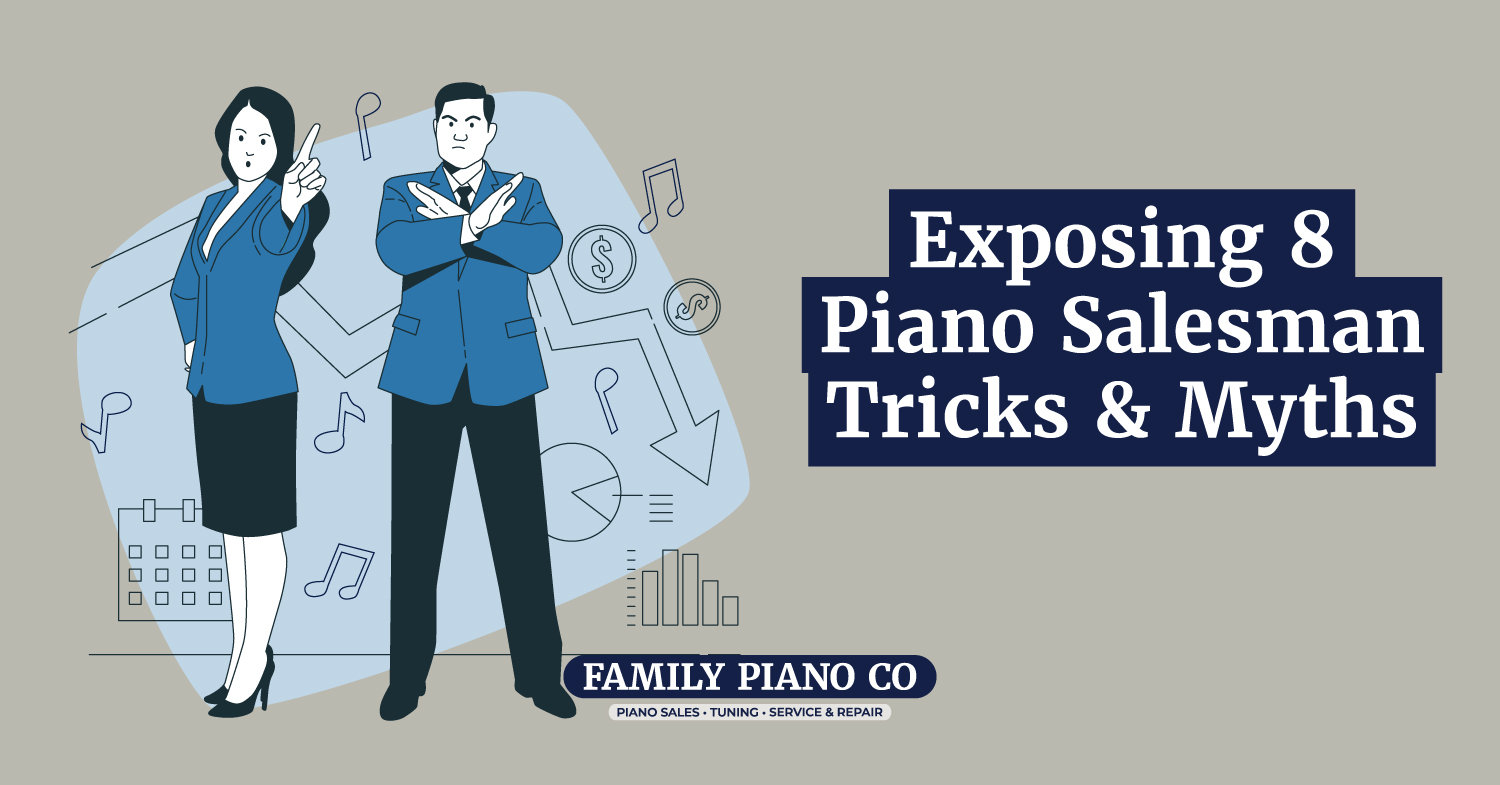
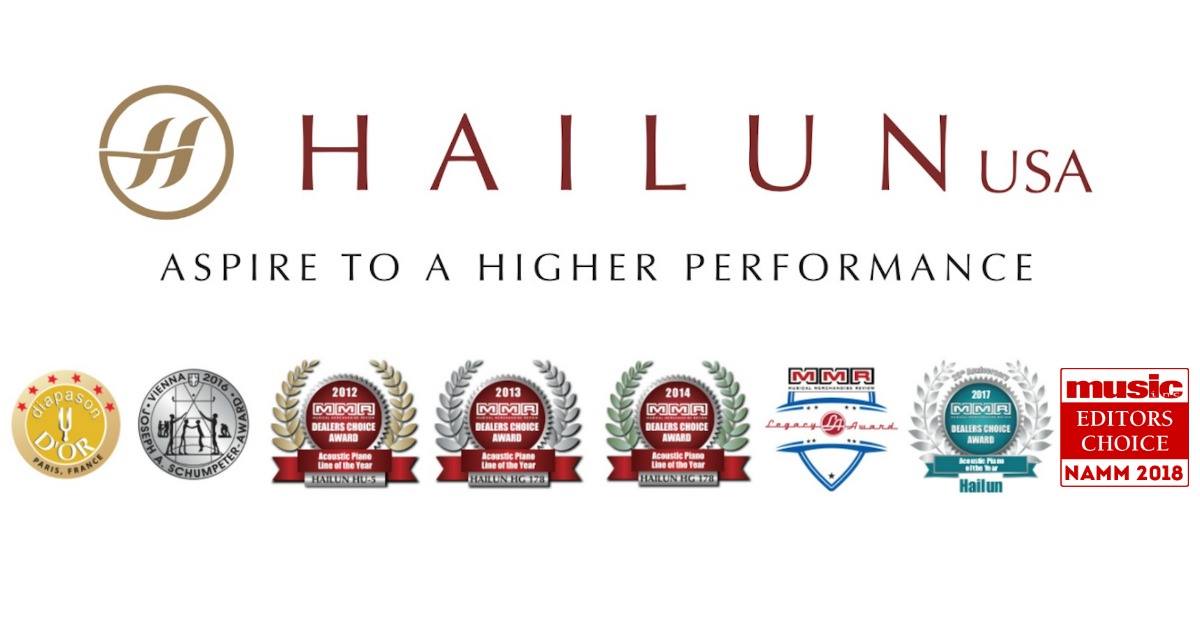
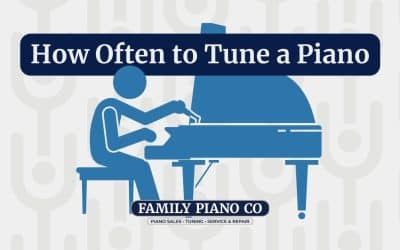
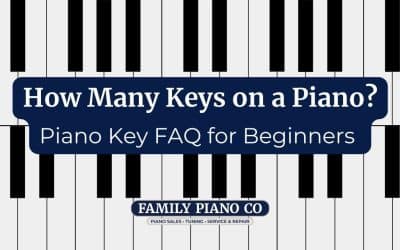

Great info! I watched the Steinway video and noticed how they quickly said a new 9′ black grand was “their most economical finish” at a gazillion dollars (making it sound like a bargain) and jumped quickly into multi-million dollar paint jobs! Also, if anyone could buy new pianos retail and use them, then sell them for a profit?? I’m sure you would have figured out how to do this and not bothered with a retail store. Early to mid 20th century, many brands of pianos sold brand new for a few hundred dollars – which was a princely sum when skilled wages were $1-3 per day! It it’s been maintained and is a good piano, of course it will sell for more than that in today’s dollars. Anyway, this was very informative and accurate info.
Thanks, Alice! Glad to hear your thoughts on this especially. Honestly, hadn’t even considered how inflation affects perceived market value. You can find 1920 ads for pianos selling at $400, and that’s more like $6,000 today. Crazy how consistent that is with prices for new uprights today — even if it does seem 15x more expensive. Definitely something that helps perceived value for older instruments overall! I’ll be using this info in a future post for sure! (: